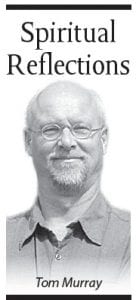When I was in first grade I went to North Side Elementary School in Albert Lea. It was a school from a bygone era, with creaky wooden floors, drafty old windows and an asphalt playground. On the second floor sat a large wooden lost and found box that was filled to the top with articles of clothing. It was amazing how full that box was.
I think that there were hats and scarves still in there that had been lost by my classmates’ parents during the Great Depression.
One morning when I put my coat on I realized that my mittens weren’t where they were supposed to be. They were supposed to be attached to those little elastic things that my mom had clipped to the ends of my sleeves so that I couldn’t possibly lose them, but my sleeves were empty. My first thought, of course, was to tell my mom, but that thought only lasted a second or so. My mom is Lutheran, and she still believes in grace, but losing yet another pair of mittens seemed sure to test the depth of her forgiveness.
So I decided to do the wise thing. I’d walk to school with my hands in my pockets and then check the lost and found box when I got there. When the bell rang I ran into the school and up the steps to the lost and found box and threw open the lid. And right there, on top of the pile, was one of my mittens. I was saved! Now all I had to do was to dig through and pull the other one out. And so I started digging. And as I got further and further down, I started to panic.
It’s not here! I stood there in disbelief. It didn’t make any sense. How could I lose both mittens and then have only one of them show up in the lost and found box?
In the Gospel of Luke, Jesus tells parables about lost things. He could have told a parable about lost mittens, I suppose, but instead he told about lost sheep, lost coins and a lost son.
He spoke of things that were familiar to those who eagerly listened to his stories. His parables of the lost sheep and the lost coin tell of people who search diligently and faithfully for what is lost. In his story of the lost son, the father runs and embraces him when he returns. What connects these parables is that there is great rejoicing when what is lost is finally found.
Jesus’ parables about finding lost things remind us that God looks everywhere for the lost so that all might live the joy of the resurrection. God looks everywhere!
That means that God is present even in the worst places we could imagine. God is found in the drug-infested alleyways of our inner cities and in the meth labs that are scattered throughout our rural communities. God is found in broken homes and in broken lives, as well as in prison cells and in corporate suites. God is present in mosques in Afghanistan, temples in Burma, synagogues in Israel, and churches along the North Shore.
Why?
Because God is faithfully looking for those who are lost, and there are lost people everywhere.
There is no place on this Earth where God’s healing presence isn’t found. This is both comforting and challenging for us. We are comforted in knowing that God is with us each day that we live, even as we are challenged by our calling to extend our love and care to those whom we are uncomfortable being around.
We live out the challenge of the gospel by going out into the darkest places and searching for those who are lost and afraid. We are called to venture out, away from the safety of our little community, and share our faith so that others might live in the joy of the empty tomb. We can never know where we will find the lost. We can never know who it is that God is calling us to serve. All we can do is pray that we will be God’s hands, holding those who need us, and searching everywhere for those in need of our embrace.
One final thought. My mom found my other mitten the next spring zipped up in the inside pocket of my parka. You just never know where you’ll find something.
Each month a member of the Cook County Ministerium will offer Spiritual Reflections. This month’s contributor is Pastor Tom Murray of the Lutsen Lutheran and Zion Lutheran Church of Finland.



Loading Comments